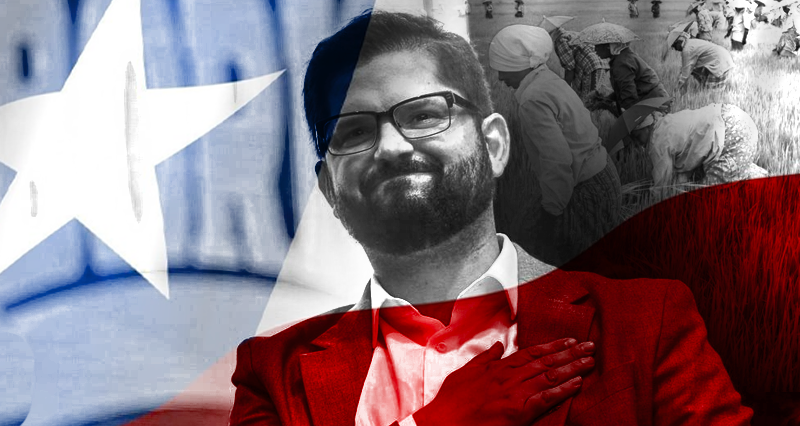Chile has elected its new president. Gabriel Boric Font has received 56% of the votes in the second round, while the other candidate, José Antonio Kast ended with 44%, while 99% of the votes have been counted.
Voters participation has increased 8% in comparison to the first election round, reaching with 56% the highest level since mandatory vote was abolished in 2012. In the first round held in November 19, Kast had received 28 and Boric 26% of the votes. Kast already congratulated Boric for his electoral victory, while the latter stated his government will be “the government of all Chileans, whether they voted for me or not”.
Boric now begins a transition period and will assume office in march 2022. With 35 years, he is one of the youngest presidents worldwide and has started his political career during the protests of 2019 against the rise of transportation costs.
Boric has been endorsed by a wide leftist coalition named “Approving Dignity”, which included the Communist Party of Chile. Following the first round, Boric also gained the support of the center-left New Social Pact coalition, including former Socialist Party President Michelle Bachelet.
“If Chile was the cradle of neoliberalism, it will also be its grave” – Boric
Gabriel Boric has made his way into politics mainly through student protests, starting in 2011. Boric led as a student led the Federation of Students at the University of Chile in Santiago. He rose to prominence leading protests in 2011 demanding improved and cheaper education.
He made a reference to this background when he stated in his first speech after the elections that “his government will not surround itself with walls but have its legs on the streets”.
Chile has been a model country for the implementation of neoliberal policies during the 70s and 80, under the military government of Augusto Pinochet and advised by economists such as Milton Friedman from the Chicago School.
Boric in exchange has attacked the neoliberal model frequently in his election campaign. He advocated for the state’s leading role in providing health, education and transportation. He promised to end Chile’s private pension system — the hallmark of the neoliberal economic model imposed by the dictatorship of Gen. Augusto Pinochet.
Feminism, minority rights especially concerning the indigenous Mapuche people as well as LGBT and climate change were also major topics of Boric, who advocates for a decentralization of the political system.
His political program includes besides of “Green taxes” and “feminist investments” new taxes on the exploitation of Chile’s cooper mines – the country is the largest producer and exporter of the mine worldwide.
In his first speech, Boric made a strong emphasis on income equality, stating “an economic growth that occurs with social inequality, has feet of clay. Only with social cohesion can we advance towards a true sustained development.” “Economic growth and just distribution goe hand in hand”, added Boric.
He promised “advancing social rights while carrying financial responsibility and taking care of the macroeconomy.”
He made a strong commitment to “defending democracy”, which “includes continous participation of all sectors of society, all neighborhoods, all social groups in politics.”
In reference to the country deeply divided in the elections, Boric stated that “substantive changes need broad agreements”. He announced to defend a “just system of pensions in Chile without involvement of private pension funds”.
Gratulations from governments in Latin America
Presidents governing Chile’s neighbor countries congratulated Gabriel Boric. Argentina’s President Fernandez tweeted “to assume the commitment to strengthen the bonds of brotherhood that unite our countries and to work together with the region to put an end to inequality in Latin America”, while Peru’s Pedro Castilo called to “continue fighting for the unity of our nations.”
Congratulations also came from Colombia, Venezuela, Cuba and other Latin American countries.
Constitutional process
Meanwhile, Boric’s election is considered a push for the process of writing a new constitution for Chile. The president himself reconfirmed his support for the work of the Constitutional Convention, which is expected to present a draft in 2022.
Boric’s competitor proposed a more conservative line concerning the new constition, while openly defending the Pinochet era. Boric has made clear the overcome the constitution of Pinochet, but some as the US news agency Associated Press argue that he will press for a social democratic system. This might not suffice some fractions of the Convention which desire to go further towards nationalizations.
The convention could in theory call for new presidential elections when it concludes its work next year and if the new charter is ratified in a plebiscite.
















Leave a Reply